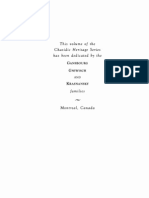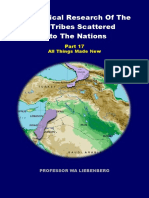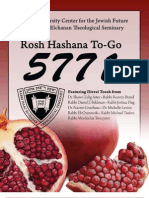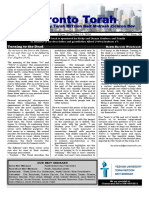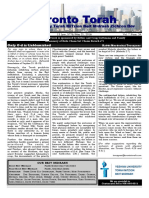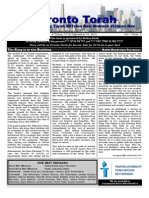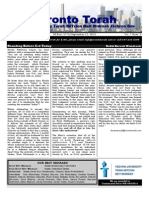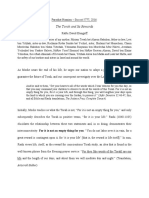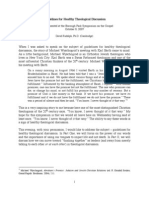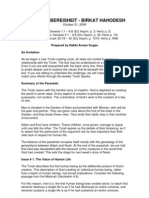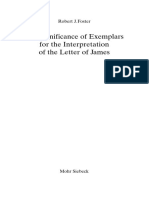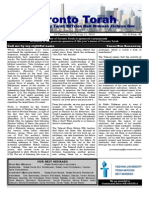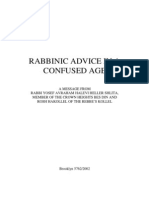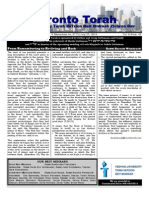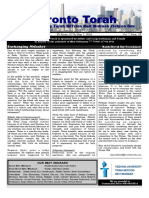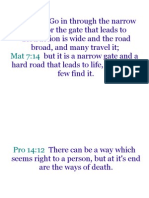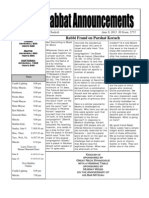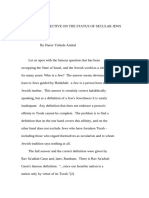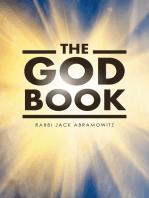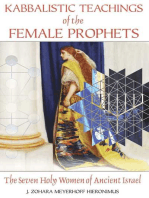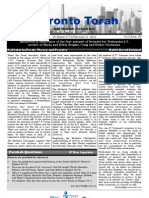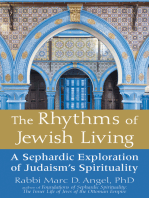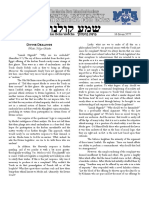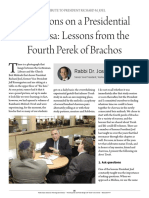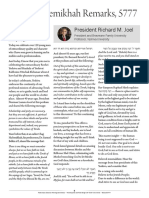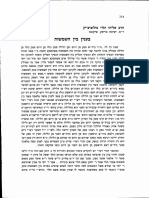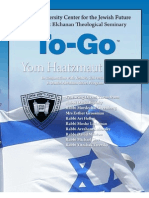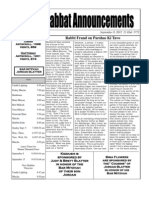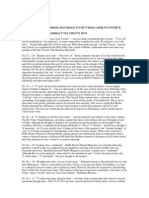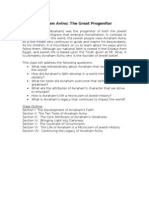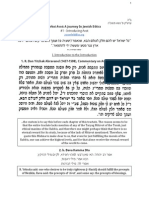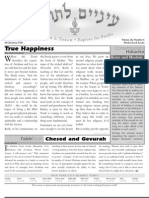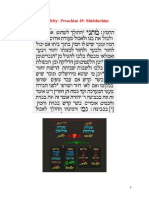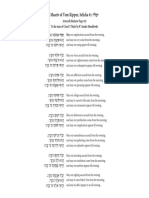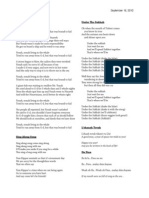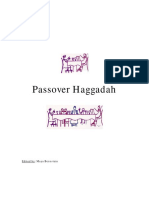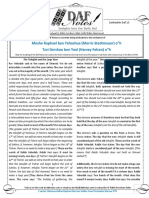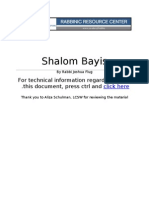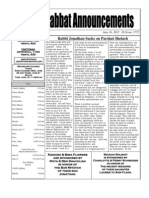Toronto Torah
Toronto Torah
Uploaded by
outdash2Copyright:
Available Formats
Toronto Torah
Toronto Torah
Uploaded by
outdash2Original Title
Copyright
Available Formats
Share this document
Did you find this document useful?
Is this content inappropriate?
Copyright:
Available Formats
Toronto Torah
Toronto Torah
Uploaded by
outdash2Copyright:
Available Formats
Toronto Torah
Yeshiva University Torah MiTzion Beit Midrash Zichron Dov
Parshiyot Behar-Bechukotai
27 Iyar, 5775/May 16, 2015
Vol. 6 Num. 32
This issue of Toronto Torah is sponsored by Esther and Craig Guttmann and Family
Yerushalayim: See the World to Come in the World that Is Rabbi Baruch Weintraub
If you will follow My statutes and
observe My commandments and
perform them, I will send your rains in
their time, the land will yield its
produce, and the tree of the field will
give forth its fruit. (Vayikra 26:3-4)
These promises of prosperity, given by
Hashem to his people, have puzzled
the commentators for many
generations. Their perplexity has
stemmed less from what the Torah
says, and more from what is absent. In
the words of Don Isaac Abarbanel,
Why is it that all of the rewards
promised by the Torah are physical?
Why were the people not promised the
perfection of their soul and its reward
in the afterlife, since that is the end of
all men and their true success?
As Abarbanel notes, this question was
not only philosophical or
interpretative; rather, it carried a
heavy existential weight, as it was
used by Christians to undermine the
Jews hope to be compensated in the
afterlife for their sufferings in this
world. Christian theologians (some of
them converted Jews) who claimed
that the Torah never promised the
Jews a reward in the afterlife mocked
this hope.
Abarbanel offered no fewer than seven
different answers. We will briefly
present six of them here:
1. Rambam The Torah omits
otherworldly reward in order to
encourage altruistic mitzvot; the
passages describing reward in this
world are meant to promise the
means to serve Hashem without
disruption.
2.
3.
4.
5.
6.
Ibn Ezra The Torah omits
discussion of reward in the afterlife
because it is a spiritual concept
beyond the understanding of most
people. Hashem promised a reward
which could be understood by all.
Rabbeinu Bachya The Torah
omits explanation of the afterlifes
reward because it is a natural
phenomenon; the rewards
described in the Torah are
miraculous.
Rabbi Saadia Gaon The Torah
promises reward in order to fight
the attraction of idolatry. Since
priests of idolatry promise physical
reward, the Torah also offers
promises in that realm.
Ramban The Torah promises
national reward, and the afterlife is
a personal experience.
Kuzari The Torah does not
promise that which cannot be
proved; the Torah puts its words to
the test by presenting promises for
this world.
All of these answers are intriguing, but I
would focus on the seventh answer
presented by Abarbanel, also in the
name of Rabbi Yehuda Halevi in his
Kuzari. According to this answer, a
close reading of our parshah will reveal
that the Torah did indeed choose to
address the people with a reward for
this world. However, the reward is not
physical. The promise made by Hashem
is, I will place My dwelling in your
midst,I will walk among you and be
your G-d, and you will be My
people. (Vayikra 26:11-12) The goal is
not only a spiritual elevation in a
strictly spiritual world, but a deep
spiritual experience here on Earth.
Abarbanel notes that this view solves
the problem of the missing afterlife. If
G-d promises spiritual satisfaction while
the soul is confined in a material body,
how much more so will it be in the
afterlife, with the physical weights
finally removed. However, we will focus
on the meaning that this explanation
gives to our world. If we were to
formulate this meaning in one word, it
would be: Redemption.
What the Torah promises us, according
to this point of view, is the abilty to
redeem this world. It enables us to go
beyond merely seeing this world as a
corridor leading to a completely different
and altered existence, connected to it
only by the means of actions and
consequences, and into seeing our
mission in this world as rebuilding the
corridor into the main room. The world
to come is here within, waiting for us to
expose it - and so is G-d.
Yerushalayim, in itself, embodies this
dream of connecting heaven and earth
a heavenly and a physical city merged
into one. Its liberation 48 years ago let
us glimpse, for a short time, how the
world can look like when the promise of,
I will walk among you and be your G-d,
and you will be My people begins its
realization.
Yom Yerushalayim sameach, and may
we merit the completion of our
redemption!
bweintraub@torontotorah.com
OUR BEIT MIDRASH
ROSH BEIT MIDRASH
RABBI MORDECHAI TORCZYNER
AVREICHIM RABBI DAVID ELY GRUNDLAND, RABBI JOSH GUTENBERG, YISROEL
MEIR ROSENZWEIG
COMMUNITY MAGGIDEI SHIUR
RABBI ELAN MAZER, RABBI BARUCH WEINTRAUB
CHAVERIM DAR BARUCHIM, YEDIDYA FISCHMAN, DANIEL GEMARA, SHMUEL GIBLON,
YOSEF HERZIG, BJ KOROBKIN, RYAN JENAH, JOEL JESIN, SHIMMY JESIN, YISHAI
KURTZ, ZACK MINCER, MITCHELL PERLMUTTER, JACOB POSLUNS, ARYEH ROSEN, ARIEL
SHIELDS, EFRON STURMWIND, DAVID SUTTNER, DAVID TOBIS, EYTAN WEISZ
We are grateful to
Continental Press 905-660-0311
Book Review: The Rav Speaks
The Rav Speaks
Rabbi Yosef Dov Soloveitchik
English, trans. from Yiddish
Judaica Press, 2002
About this book
In 1950s and 1960s America, Rabbi
Yosef Dov Soloveitchik was the
rabbinical leader of Religious Zionist
Judaism. Although he had been a
member of American Agudas Yisroels
Moetzes Gedolei haTorah in the 1940s,
in the ensuing years Rabbi Soloveitchik
came to believe that Religious Zionism
was the path most desirable to Hashem,
and he joined Mizrachi.
Renowned for his erudition, wisdom
and integrity, Rabbi Soloveitchik
inspired many thousands of followers
with his eloquent, Torah-grounded
presentation of a worldview that
mandated careful halachic observance
and vigorous support for the State of
Israel. One articulation of his ideas on
Zionism came in his Kol Dodi Dofek
1956 Hebrew address delivered on Yom
haAtzmaut, 1956, at Yeshiva University
(reviewed in Toronto Torah 6:12).
Another was in his set of five Yiddish
addresses to the annual conventions of
Mizrachi between 1962 and 1967.
These addresses were translated into
Hebrew and published as Chamesh
Derashot, and later into English as The
Rav Speaks. In these addresses, Rabbi
Soloveitchik articulated a profound
philosophy of Zionism and a robust
vision for religious political activism in
a modern State of Israel.
Each of the five addresses examines
elements and themes from the book of
Bereishit, and applies them to the
Religious Zionist mission. For example,
the first talk examines the conflicting
visions of Joseph and his brothers,
and identifies Josephs message of
leaving comfortable Canaan with that
of the Zionists who left Europe for then
-Palestine. In another example, the
second talk studies the relationship
between Yaakov and Esav as
envisioned by their parents, and
identifies Rivkahs model with that of
Mizrachi. The speeches are in
relatively simple language, meant to
appeal to a popular audience.
Is this book still relevant?
In the preface to the Hebrew edition,
the publishers write, Although these
speeches were presented in historical
circumstances which differ from our
own, we hope that readers will find
that these speeches, with the insights
and values they present, contain light
to illuminate our path today as well.
613 Mitzvot: #436: To destroy idolatry
Many of the Torahs mitzvot focus on separating the Jewish
nation from the idols of their neighbours. This includes
prohibitions against worshipping idols (Mitzvot 28 and 29 in
the count of Sefer haChinuch), producing idols (Mitzvot 27
and 39), and owning or using idols (Mitzvot 428 and 429). In
addition, there is a mitzvah of distancing ones self from
idolatry, in its various forms. (Mitzvot 86, 87 and 462) In
Devarim 12:2, the Jews entering the land of Canaan are
given an additional command, You shall destroy all of the
places where the nations serve [their idols]. This is
numbered by Sefer haChinuch as the Torahs 436th mitzvah.
Of course, a Jew living in the age of Al Qaeda and ISIS must
be somewhat disturbed by this mitzvah; are we meant to be
the equals of rampaging terrorists, invading lands and
demolishing their museums and heritage sites?
It is hard to find any resolution which will fully address this
concern, but two points are worth noting:
The Torah does not anticipate an ISIS-esque rampage.
The obligation is not to seek out idolatry wherever it is
located; the command is specific to the land of Israel.
(Rambam, Mishneh Torah, Hilchot Avodah Zarah 7:1)
Further, the obligation does not extend to attacking
ruins, museums and defunct sites dedicated to tourism;
when people who worship an idol abandon its service,
the idol loses its status. (Rambam, Mishneh Torah,
Hilchot Avodah Zarah 8:11)
On a philosophical level, the Torah commands the
destruction of idolatry because it perceives in idolatry a
profound offense to G-d, as well as a primary root for the
worst human corruption.
Rabbi Mordechai Torczyner
In this reviewers mind, the speeches
certainly succeed in this regard. They
respond to practical challenges, and
their message is timeless.
In one of these five speeches, Rabbi
Soloveitchik coined a fourteenth Ani
Maamin declaration of faith for the
Jewish people: What is this Ani
Maamin? It is expressed in a simple
declaration: I believe, with complete
faith, that this Torah is to be fulfilled,
actualized and fully executed in every
place and every era, in all social,
financial and cultural circumstances,
in all technological circumstances and
political conditions. Torah is to be
actualized, whether in the simple
society and homogeneous market of
the ghetto or in the modern,
scientifically developed and designed
society, in which the Jew is an integral
part of his environs beyond any
connection with his personal domain.
Torah is to be actualized whether in
exile, where it relates to the personal
life of the Jew, or in the Jewish state,
where it is required to address novel
challenges and to encompass, as well,
the structures of communal life. This
is but one worthy example of the
eternally relevant messages found
within The Rav Speaks.
torczyner@torontotorah.com
Rabbi Mordechai Torczyner
The Torah links idolatry with socially perverse
communities. From the humiliation of intoxicated
Noach involving his son Cham and his grandson
Canaan, to Avrahams warning about the debauchery of
Egypt and the Philistines in Grar, to the barbaric
abuses of Sdom, to the rape and lawlessness of
Shechem, the book of Bereishit conveys the message
that the societys of pagan Canaan paired idolatry with
the greatest immorality. This is not taken as mere
correlation, but as cause and effect; Vayikra 18:3 warns
the Jew not to emulate the deeds of the lands of Egypt
and Canaan, and then it launches into a list of varieties
of sexual immorality capped by a prohibition against
worship of the Moloch idolatry. Through the biblical
lens, an embrace of pantheism brings with it social
irresponsibility, and an emulation of the hedonism
associated with the pantheons own deities.
In this light, idolatry is not only a personal peccadillo
which is between G-d and the individual, such that
modern society might say To each his own, but a
pernicious undermining of our world on levels both
spiritual and physical. In a world which no longer sees
idolatry that way, it is understandable that we will feel
more comfortable with relativism than with the rampage
but perhaps we ought to then ask ourselves: Does
anything deserve destruction?
This mitzvah remains difficult to accept, but it raises
questions deserving our contemplation.
torczyner@torontotorah.com
Visit us at www.torontotorah.com
Biography
Torah and Translation
Rabbi Yitzchak Arama
Why doesnt the Torah link
Matan Torah and Shavuot?
Rabbi Josh Gutenberg
Adapted from a biography
written by Rabbi Adam Frieberg
Rabbi Yitzchak Arama was born in Spain
in 1420. After serving as head of a
rabbinical academy in Zamora, Spain, he
became a community teacher in
Tarragona. Later he served as the
community rabbi in Calatayud until he
was expelled with the rest of Spanish
Jewry in 1492. He then settled in Naples,
Italy, where he died in 1494.
Like many Spanish scholars of his time,
Rabbi Arama was a Talmudist; he
considered the study of Talmud to be
extremely important. He was despondent
when the community in Tarragona was
unable to financially support his
students, forcing him to move on and
leave those students behind.
In addition to his focus on the Talmud,
Rabbi Arama was well-versed in both
Jewish and secular philosophy. This was
especially important in medieval Spain,
where no community leader would be
respected without this knowledge. He
was fluent in Maimonidean philosophy,
although he did not always agree with all
of its positions. His thought was largely
influenced by the Zohar and Rabbi
Yehudah HaLevi, and this is evident in
his work.
Rabbi Arama wrote a prominent
commentary to the Torah, Akeidat
Yitzchak. The commentary consists of
over one hundred lectures on the weekly
parshah. Each lecture includes a
passage from the Zohar and a
philosophical discourse based on that
passage. His ideas are often quoted in
Don Isaac Abarbanels commentary to
the Torah, although he usually is not
cited by name. Some of his other written
works include a commentary on the five
megillot as well as a commentary on
Mishlei. His works were so influential
that the Chida wrote of him, some 250
years later, All of the writings of the
orators drink from his faithful waters.
jgutenberg@torontotorah.com
Visit us at www.torontotorah.com
Rabbi Yitzchak Arama, Akeidat Yitzchak, Emor Shaar 65
Translated by Rabbi Josh Gutenberg
:
,
,
,
?
Behold, there is a strong question here
which is: Why didnt the Torah explicitly
state that [on] this day, which is the
holiday of Shavuot, we should remember
and make it a remembrance of the
giving of the Divine Torah and its
acceptance? This would be logical, given
our established custom, and the custom
of our ancestors, in the text of our
prayers and the Torah reading, to state
[similar remembrances] regarding the
holidays of Pesach and Sukkot, and also
on Rosh Hashanah and Yom Kippur?
I have two answers to resolve this:
,
:
First, there is no way for the Torah to
command this other than after it is
accepted, just as the earlier rabbis wrote
that there is no reason that [belief in]
the existence of G-d [should be
considered a] commandment, because
there are no commandments without
assuming that G-ds existence is a
commandment. For this reason Bahag
did not include it in his count of the
commandments, as Ramban writes in
his [comments on] Sefer haMitzvot.
Similarly, how could the Torah
command us to celebrate the day of
accepting [the Torah] and the beginning
of its existence, unless we had already
accepted this matter to be true?
,
( ,
)
,
.) , (
...)(
( )
.
.
The second [reason] is that
commemorating the Torah and its
acceptance cannot be [limited] to a
specific time like other matters of the
holidays. This commandment [applies]
every day, every moment and every hour
as is written, The book of Torah shall
not move from your mouth, and you
shall meditate upon it day and
night. (Yehoshua 1:8) Every single day
we are commanded [to view the Torah]
as new and beloved in our eyes like [it
was on the] day it was given, as is
written, On this day G-d, your Lord,
commands you... (Devarim 26:16) as
explained by Midrash Tanchuma (Ki
Tavo)... Regarding the giving of the
Torah, [the Torah] relied upon the
publicity written explicitly in the section,
In the third month (Shemot 19) which
is clear exposure which cannot be
ignored. And both answers are correct in
my eyes.
This Week in Israeli History: 28 Iyar, 1904
Rabbi Kook Makes Aliyah
Yisroel Meir Rosenzweig
28 Iyar is Sunday
Made Aliyah to the Holy Land on 28 Iyar 5664 (1904). Went
up to Yerushalayim on 3 Elul 5679 (1918). Rose to Heaven on
3 Elul 5695 (1935).
These simple words are inscribed upon Rabbi Avraham
Yitzchak HaKohen Kooks tombstone on the Mount of
Olives. While they dont appear to detail any of Rabbi Kooks
tremendous accomplishments, they do speak to the essence
of his character. His focus in life was to always climb
upwards, both physically and spiritual. The fruits of his
growth made an indelible impact on modern Jewish life in
and out of Israel.
After serving as Rabbi of several towns in Europe, Rav Kook
was invited to serve as the Rabbi of Jaffa and its
surrounding areas. Upon accepting the offer, he and his
family made Aliyah on the 28th of Iyyar, beginning a period
of incredible productivity. Until this point, Rabbi Kooks
unique philosophy had been in its fledgling stages, and now
it could truly flourish. Fueled by the inspiration that he found
in Israel, Rabbi Kooks literary accomplishments during his
time in Jaffa include the opening sections of Orot HaTeshuvah,
as well as his important treatise on the laws of Shemitah,
Shabbat HaAretz.
The newspaper, Hashkafah from May 19, 1904 printed a short
portrayal of the communitys reception of Rabbi Kook on his
first Shabbat in Jaffa. He is described as having, [L]eft a very
good impression upon the community being addressed, for the
Rabbi spoke in a clear, pure Hebrew. The Sefardim also
understood his words and enjoyed them. In another article,
the writer concludes, We hope that, in his days, peace comes
and rests upon our city. Rabbi Kooks lasting legacy should
indeed be a source of peace in our days as well.
To access the Hashkafah articles in their original, please see
http://goo.gl/stjqxv and http://goo.gl/OEvw9W.
yrosenzweig@torontotorah.com
Weekly Highlights: May 16 May 22 / 27 Iyar 4 Sivan
Time
Speaker
Topic
Location
Special Notes
After Hashkamah
Yisroel Meir Rosenzweg
Is there a berachah on
Kiddush Hashem?
Clanton Park
5:30 PM
R David Ely Grundland
Parent-Child Learning
Shaarei Shomayim
5:30 PM
R Mordechai Torczyner
Good Fences Make
Good Neighbours
BAYT
Womens Shiur
R Josh Gutenberg
Daf Yomi
BAYT
Rabbis Classroom
R Mordechai Torczyner
Gemara Avodah Zarah:
Aphrodites Bath?
BAYT
West Wing Library
May 15-16
Before Pirkei Avot
After minchah
Sun. May 17
8:30 AM
Yom Yerushalayim
Special Minyan for Yom Yerushalayim
At Zichron Yisroel of the AHS, 300 Atkinson Ave, Thornhill
8:45 AM
R Josh Gutenberg
Contemporary Halachah:
Starting Shabbat Early
BAYT
Third floor
9:15 AM
R Shalom Krell
Kuzari
Zichron Yisroel
With light breakfast
R Mordechai Torczyner
Book of Job: G-d as Enemy
Shaarei Shomayim
Tues. May 19
1:30 PM
Wed. May 20
Rosh Chodesh Sivan
8:15 PM
R Mordechai Torczyner
Is There a Mitzvah of
Getting a Job?
BAYT
Thornhill BYachad
Night of Learning
R Mordechai Torczyner
The Book of Yehoshua
49 Michael Ct.
Thornhill
Not this week
R Mordechai Torczyner
Advanced Shemitah
Yeshivat Or Chaim
Not this week
Thu. May 21
1:30 PM
Fri. May 22
10:30 AM
OUR MISSION: TO ENGAGE, INSPIRE AND EDUCATE THE JEWISH COMMUNITY OF THE GREATER TORONTO AREA. WE APPLY OUR
TORAH HERITAGE TO THE DAILY LIVES OF MODERN JEWS, THROUGH CLASSES, DISCUSSIONS AND CHAVRUTOT IN OUR HOME BEIT
MIDRASH AND OUR BNEI AKIVA SCHOOLS, AS WELL AS THE SYNAGOGUES, CAMPUSES AND WORKPLACES OF THE GTA.
We are funded by the Toronto community. To become a 5775 supporting member for $36, please email
info@torontotorah.com or go to http://www.torontotorah.com/members. Thank you for your continued partnership.
You might also like
- Rav Soloveitchik-The Common-Sense Rebellion Against Torah AuthorityDocument6 pagesRav Soloveitchik-The Common-Sense Rebellion Against Torah AuthorityTechRav100% (7)
- Maaneh Lashon Hebrew - English 2018 PDFDocument93 pagesMaaneh Lashon Hebrew - English 2018 PDFMoyn Both100% (1)
- Journey of A SoulDocument104 pagesJourney of A SoulFelipe Garrido100% (3)
- 10 Minute Dayenu SederDocument6 pages10 Minute Dayenu Sederrhdoiua0% (1)
- A Historical Research of The Ten TribesDocument57 pagesA Historical Research of The Ten TribesDavidChichinadze100% (1)
- Lessons Learned From Conversion: Rabbi Zvi RommDocument5 pagesLessons Learned From Conversion: Rabbi Zvi Rommoutdash2No ratings yet
- Details Count: Parashat Naso Sivan 12 5774 May 30, 2015 Vol. 24 No. 32Document4 pagesDetails Count: Parashat Naso Sivan 12 5774 May 30, 2015 Vol. 24 No. 32outdash2No ratings yet
- UntitledDocument4 pagesUntitledoutdash2No ratings yet
- UntitledDocument68 pagesUntitledoutdash2No ratings yet
- To Contemplate The Holy: 25 Adar I, 5776/march 5, 2016 Parshat Vayakhel/Shekalim Vol. 7 Num. 26Document4 pagesTo Contemplate The Holy: 25 Adar I, 5776/march 5, 2016 Parshat Vayakhel/Shekalim Vol. 7 Num. 26outdash2No ratings yet
- Toronto TorahDocument4 pagesToronto Torahoutdash2No ratings yet
- To Contemplate The Holy: 25 Adar I, 5776/march 5, 2016 Parshat Vayakhel Vol. 7 Num. 26Document4 pagesTo Contemplate The Holy: 25 Adar I, 5776/march 5, 2016 Parshat Vayakhel Vol. 7 Num. 26outdash2No ratings yet
- Turning To The DeadDocument4 pagesTurning To The Deadoutdash2No ratings yet
- The Power of PreparationDocument4 pagesThe Power of Preparationoutdash2No ratings yet
- Teaching The Mesorah: Avodah Namely, He Is Both A Posek (Halachic Decisor) and An Educator For The EntireDocument5 pagesTeaching The Mesorah: Avodah Namely, He Is Both A Posek (Halachic Decisor) and An Educator For The Entireoutdash2No ratings yet
- Only G-D Is UnblemishedDocument4 pagesOnly G-D Is Unblemishedoutdash2No ratings yet
- Torah 101-Pinchus Portion I. Answers To Last Week'S Study Questions (From Balak)Document5 pagesTorah 101-Pinchus Portion I. Answers To Last Week'S Study Questions (From Balak)api-204785694No ratings yet
- The Sefer Habrit and Naaseh V'nishmahDocument5 pagesThe Sefer Habrit and Naaseh V'nishmahoutdash2No ratings yet
- Repentance As FreedomDocument4 pagesRepentance As Freedomoutdash2No ratings yet
- The Goal of It AllDocument4 pagesThe Goal of It Alloutdash2No ratings yet
- 35 SE NassoDocument8 pages35 SE NassoAdrian CarpioNo ratings yet
- UntitledDocument4 pagesUntitledoutdash2No ratings yet
- The King Is in The Building: This Issue Is Sponsored by Nathan Kirsh in Loving Memory of His Parents andDocument4 pagesThe King Is in The Building: This Issue Is Sponsored by Nathan Kirsh in Loving Memory of His Parents andoutdash2No ratings yet
- Toronto TorahDocument4 pagesToronto Torahoutdash2No ratings yet
- Toronto TorahDocument4 pagesToronto Torahoutdash2No ratings yet
- Standing Before G-D Today: 28 Elul, 5775/september 12, 2015 Parshat Netzavim Vol. 7 Num. 3Document4 pagesStanding Before G-D Today: 28 Elul, 5775/september 12, 2015 Parshat Netzavim Vol. 7 Num. 3outdash2No ratings yet
- Toronto TorahDocument4 pagesToronto Torahoutdash2No ratings yet
- An Introduction To The Lawh-I Haqqu'n-NasDocument4 pagesAn Introduction To The Lawh-I Haqqu'n-NasSiyyid Adib LaganNo ratings yet
- Shiluach Hakein-A Lesson in What, Exactly?Document4 pagesShiluach Hakein-A Lesson in What, Exactly?outdash2No ratings yet
- The Torah and Its Rewards: Artscroll Siddur)Document4 pagesThe Torah and Its Rewards: Artscroll Siddur)outdash2No ratings yet
- The Lubavitcher Rebbe's Topsy-Turvy Sukkah: Rabbi Yosef BronsteinDocument5 pagesThe Lubavitcher Rebbe's Topsy-Turvy Sukkah: Rabbi Yosef Bronsteinoutdash2No ratings yet
- Guidelines For Theological DiscussionDocument7 pagesGuidelines For Theological DiscussionmjtimediaNo ratings yet
- Torah Sparks 5767Document145 pagesTorah Sparks 5767api-3811809No ratings yet
- Foster 2014Document6 pagesFoster 2014lutizujwNo ratings yet
- Call Me by My Rightful Name: 24 Tammuz, 5775/july 11, 2015 Parshat Pinchas Vol. 6 Num. 40Document4 pagesCall Me by My Rightful Name: 24 Tammuz, 5775/july 11, 2015 Parshat Pinchas Vol. 6 Num. 40outdash2No ratings yet
- Toronto TorahDocument4 pagesToronto Torahoutdash2No ratings yet
- Rabbinic Advice in A Confused AgeDocument7 pagesRabbinic Advice in A Confused Ageash.shalom100% (1)
- From Remembering To Re-Living and BackDocument4 pagesFrom Remembering To Re-Living and Backoutdash2No ratings yet
- Nefashot: ExchangingDocument4 pagesNefashot: Exchangingoutdash2No ratings yet
- Oral Law-Not So Fun Facts!Document81 pagesOral Law-Not So Fun Facts!Justin EmmonsNo ratings yet
- UntitledDocument8 pagesUntitledoutdash2No ratings yet
- A Lesson in Life, On A LifeboatDocument4 pagesA Lesson in Life, On A Lifeboatoutdash2No ratings yet
- UntitledDocument24 pagesUntitledoutdashNo ratings yet
- Toronto TorahDocument4 pagesToronto Torahoutdash2No ratings yet
- Introduction To The System of HalachahDocument8 pagesIntroduction To The System of Halachahjorge davilaNo ratings yet
- Shabbat Announcements June 8Document4 pagesShabbat Announcements June 8gnswebNo ratings yet
- Status of Secular Jews today - yheDocument32 pagesStatus of Secular Jews today - yheLuisBasileoNo ratings yet
- Zugoth - "Pairs"Document10 pagesZugoth - "Pairs"Anonymous wKjrBAYRoNo ratings yet
- 959Document50 pages959B. MerkurNo ratings yet
- In The Garden of Torah Vol 2Document173 pagesIn The Garden of Torah Vol 2Medad Aharon100% (3)
- Hebrewbooks Org 15496Document140 pagesHebrewbooks Org 15496Cris Elias MuñozNo ratings yet
- Learning Torah All over Again?: The Newest Look at the Oldest BookFrom EverandLearning Torah All over Again?: The Newest Look at the Oldest BookNo ratings yet
- In Search of A Non-Liberal Humanism: 3 Tammuz, 5775/june 20, 2015 Parshat Korach Vol. 6 Num. 37Document4 pagesIn Search of A Non-Liberal Humanism: 3 Tammuz, 5775/june 20, 2015 Parshat Korach Vol. 6 Num. 37outdash2No ratings yet
- Kabbalistic Teachings of the Female Prophets: The Seven Holy Women of Ancient IsraelFrom EverandKabbalistic Teachings of the Female Prophets: The Seven Holy Women of Ancient IsraelNo ratings yet
- Arashat Mor: Afghe K J (S)Document6 pagesArashat Mor: Afghe K J (S)queeneNo ratings yet
- Toronto TorahDocument4 pagesToronto Torahoutdash2No ratings yet
- UntitledDocument20 pagesUntitledoutdash2No ratings yet
- Toronto TorahDocument4 pagesToronto Torahoutdash2No ratings yet
- The Rhythms of Jewish Living: A Sephardic Exploration of Judaism's SpiritualityFrom EverandThe Rhythms of Jewish Living: A Sephardic Exploration of Judaism's SpiritualityRating: 3 out of 5 stars3/5 (2)
- Chavrusa: Chag Hasemikhah ז"עשתDocument28 pagesChavrusa: Chag Hasemikhah ז"עשתoutdash2No ratings yet
- UntitledDocument12 pagesUntitledoutdash2No ratings yet
- Parashas Beha'aloscha: 16 Sivan 5777Document4 pagesParashas Beha'aloscha: 16 Sivan 5777outdash2No ratings yet
- 879510Document14 pages879510outdash2No ratings yet
- The Surrogate Challenge: Rabbi Eli BelizonDocument3 pagesThe Surrogate Challenge: Rabbi Eli Belizonoutdash2No ratings yet
- UntitledDocument12 pagesUntitledoutdash2No ratings yet
- Reflections On A Presidential Chavrusa: Lessons From The Fourth Perek of BrachosDocument3 pagesReflections On A Presidential Chavrusa: Lessons From The Fourth Perek of Brachosoutdash2No ratings yet
- Consent and Coercion at Sinai: Rabbi Dr. Jacob J. SchacterDocument3 pagesConsent and Coercion at Sinai: Rabbi Dr. Jacob J. Schacteroutdash2No ratings yet
- The Meaning of The Menorah: Complete Tanach)Document4 pagesThe Meaning of The Menorah: Complete Tanach)outdash2No ratings yet
- Flowers and Trees in Shul On Shavuot: Rabbi Ezra SchwartzDocument2 pagesFlowers and Trees in Shul On Shavuot: Rabbi Ezra Schwartzoutdash2No ratings yet
- The Matan Torah Narrative and Its Leadership Lessons: Dr. Penny JoelDocument2 pagesThe Matan Torah Narrative and Its Leadership Lessons: Dr. Penny Joeloutdash2No ratings yet
- Chag Hasemikhah Remarks, 5777: President Richard M. JoelDocument2 pagesChag Hasemikhah Remarks, 5777: President Richard M. Joeloutdash2No ratings yet
- I Just Want To Drink My Tea: Mrs. Leah NagarpowersDocument2 pagesI Just Want To Drink My Tea: Mrs. Leah Nagarpowersoutdash2No ratings yet
- Shavuot To-Go - 5777 Mrs Schechter - Qq4422a83lDocument2 pagesShavuot To-Go - 5777 Mrs Schechter - Qq4422a83loutdash2No ratings yet
- Performance of Mitzvos by Conversion Candidates: Rabbi Michoel ZylbermanDocument6 pagesPerformance of Mitzvos by Conversion Candidates: Rabbi Michoel Zylbermanoutdash2No ratings yet
- What Happens in Heaven... Stays in Heaven: Rabbi Dr. Avery JoelDocument3 pagesWhat Happens in Heaven... Stays in Heaven: Rabbi Dr. Avery Joeloutdash2No ratings yet
- Experiencing The Silence of Sinai: Rabbi Menachem PennerDocument3 pagesExperiencing The Silence of Sinai: Rabbi Menachem Penneroutdash2No ratings yet
- Kabbalat Hatorah:A Tribute To President Richard & Dr. Esther JoelDocument2 pagesKabbalat Hatorah:A Tribute To President Richard & Dr. Esther Joeloutdash2No ratings yet
- The Power of Obligation: Joshua BlauDocument3 pagesThe Power of Obligation: Joshua Blauoutdash2No ratings yet
- Why Israel Matters: Ramban and The Uniqueness of The Land of IsraelDocument5 pagesWhy Israel Matters: Ramban and The Uniqueness of The Land of Israeloutdash2No ratings yet
- Lessons From Mount Sinai:: The Interplay Between Halacha and Humanity in The Gerus ProcessDocument3 pagesLessons From Mount Sinai:: The Interplay Between Halacha and Humanity in The Gerus Processoutdash2No ratings yet
- Torah To-Go: President Richard M. JoelDocument52 pagesTorah To-Go: President Richard M. Joeloutdash2No ratings yet
- 879446Document5 pages879446outdash2No ratings yet
- A Blessed Life: Rabbi Yehoshua FassDocument3 pagesA Blessed Life: Rabbi Yehoshua Fassoutdash2No ratings yet
- Yom Hamyeuchas: Rabbi Dr. Hillel DavisDocument1 pageYom Hamyeuchas: Rabbi Dr. Hillel Davisoutdash2No ratings yet
- José Faur: Modern Judaism, Vol. 12, No. 1. (Feb., 1992), Pp. 23-37Document16 pagesJosé Faur: Modern Judaism, Vol. 12, No. 1. (Feb., 1992), Pp. 23-37outdash2No ratings yet
- Nasso: To Receive Via Email VisitDocument1 pageNasso: To Receive Via Email Visitoutdash2No ratings yet
- Appreciating Moses' GreatnessDocument4 pagesAppreciating Moses' Greatnessoutdash2No ratings yet
- Chavrusa: Chag Hasemikhah ז"עשתDocument28 pagesChavrusa: Chag Hasemikhah ז"עשתoutdash2No ratings yet
- Roadmap To Prayer Lesson 52Document21 pagesRoadmap To Prayer Lesson 52Krisztian KelemenNo ratings yet
- Yeshiva University - A To-Go Series - Iyyar 5772Document60 pagesYeshiva University - A To-Go Series - Iyyar 5772outdash2No ratings yet
- Annual Jewish Calendar 2024Document2 pagesAnnual Jewish Calendar 2024karenNo ratings yet
- Sept 8th Shabbat AnnouncementsDocument4 pagesSept 8th Shabbat AnnouncementsgnswebNo ratings yet
- Shabbat 135Document22 pagesShabbat 135Julian Ungar-SargonNo ratings yet
- Are We Allowed To Celebrate No-Jewish HolidaysDocument1 pageAre We Allowed To Celebrate No-Jewish HolidaysbrofskyNo ratings yet
- L'Iluy Nishmas Imi Morosi Chavoh Bas Zvi Nif'T'Roh 6 Ador 5723 TNTZB"H Sedrah Selections Parshas T'Tza'Veh 5772 BS"DDocument4 pagesL'Iluy Nishmas Imi Morosi Chavoh Bas Zvi Nif'T'Roh 6 Ador 5723 TNTZB"H Sedrah Selections Parshas T'Tza'Veh 5772 BS"Dshlomo01No ratings yet
- Shabbath Shalom!Document11 pagesShabbath Shalom!Mystiqua KimbleNo ratings yet
- Yad L'TzedakaDocument10 pagesYad L'Tzedakaoutdash2No ratings yet
- Young Beth Jacob!: Morning AfternoonDocument2 pagesYoung Beth Jacob!: Morning AfternoonbjsdNo ratings yet
- Rabbi Hartman FlyerDocument1 pageRabbi Hartman FlyerTifereth IsraelNo ratings yet
- Jcs Resume 5-15Document2 pagesJcs Resume 5-15api-267523931No ratings yet
- Avraham Avinu: The Great ProgenitorDocument18 pagesAvraham Avinu: The Great Progenitoroutdash2No ratings yet
- Judaism 2Document48 pagesJudaism 2JD Endaya Jr.No ratings yet
- Nasso 5775 - Pirkei Avot #1Document5 pagesNasso 5775 - Pirkei Avot #1Josh RosenfeldNo ratings yet
- True Happiness: ContemporaryDocument4 pagesTrue Happiness: Contemporaryoutdash2No ratings yet
- Table of Contents David's HarpDocument5 pagesTable of Contents David's HarpYochananMauritzHummastiNo ratings yet
- Pesachim 49Document27 pagesPesachim 49Julian Ungar-SargonNo ratings yet
- 874975Document378 pages874975outdash2100% (1)
- Lyrics For Yamim Noraim SongsDocument9 pagesLyrics For Yamim Noraim Songsapi-414891659No ratings yet
- Reply To Rabbi Ysoscher Katz' Responsum On Waiting After CheeseDocument2 pagesReply To Rabbi Ysoscher Katz' Responsum On Waiting After CheeseAvrohom Gordimer100% (2)
- Rabbi Avigdor Miller Lecture CatalogDocument22 pagesRabbi Avigdor Miller Lecture Catalogbaisyisroel100% (1)
- Compassion Towards People With Disabilities: The Torah PerspectiveDocument3 pagesCompassion Towards People With Disabilities: The Torah Perspectiveoutdash2No ratings yet
- Song SheetDocument1 pageSong SheetJoel SwedloveNo ratings yet
- Passover HaggadahDocument29 pagesPassover HaggadahVivian LeighNo ratings yet
- Helpful SeforimDocument7 pagesHelpful Seforimopzia100% (1)
- Moshe Raphael Ben Yehoshua (Morris Stadtmauer) O"h Tzvi Gershon Ben Yoel (Harvey Felsen) O"hDocument5 pagesMoshe Raphael Ben Yehoshua (Morris Stadtmauer) O"h Tzvi Gershon Ben Yoel (Harvey Felsen) O"hGlaciel DavisNo ratings yet
- Shalom Bayis: For Technical Information Regarding Use of This Document, Press CTRL andDocument12 pagesShalom Bayis: For Technical Information Regarding Use of This Document, Press CTRL andoutdash2No ratings yet
- June 16 Shabbat AnnouncementsDocument4 pagesJune 16 Shabbat AnnouncementsgnswebNo ratings yet


